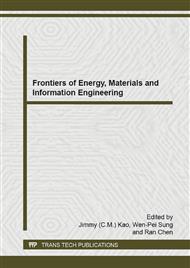p.255
p.259
p.263
p.268
p.272
p.276
p.280
p.287
p.291
Construction of User Response Subsystem for Energy Efficiency of Electric Power Supply and Demand System
Abstract:
The improvement of energy efficiency in electric power supply and demand system is involved in energy production, distribution, and using, which is a complex engineering system. Using the system theory we studied the optimization of overall resources of electric power supply and demand system. After the complex feedback mechanism of energy efficiency improvement analyzed in electric power supply and demand system, we thought that only by construction of user response subsystem can improve the energy efficiency of electric power supply and demand system. Then, some feasible suggestions for user responding subsystem were put forward.
Info:
Periodical:
Pages:
272-275
Citation:
Online since:
October 2014
Authors:
Price:
Сopyright:
© 2014 Trans Tech Publications Ltd. All Rights Reserved
Share:
Citation:


